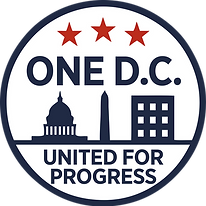
TRACEY L. LUCAS FOR D.C. MAYOR
CAMPAIGN PLATFORM 7
Strengthening Public Safety through Improved MPD Recruitment and Training
To build a police force that is not only highly skilled but also deeply integrated with the community it serves. This involves enhancing the Metropolitan Police Department's (MPD) recruitment and training processes to foster a diverse, professional, and community-focused police force. By incorporating innovative training methodologies, improving career pathways, and emphasizing community engagement, this initiative aims to reduce crime, improve public trust, and ensure the safety and well-being of all DC residents.
Key Actions
1. Evaluate Current Recruitment and Training Processes
-
Conduct a comprehensive audit of MPD’s existing hiring, vetting, and training systems.
-
Identify gaps in the recruitment pipeline, including diversity, community engagement, and retention rates.
-
Review cadet training programs to ensure alignment with modern policing standards and community-centric approaches
2. Establish a Military-Inspired Rank Progression System
-
Adopt a dual-track system inspired by the U.S. military to allow MPD officers to progress through enlisted and officer-level roles:
-
Enlisted Roles: Focus on entry-level responsibilities and field experience.
-
Officer Roles: Emphasize leadership, strategic decision-making, and community policy development.
-
-
Create clear pathways for career advancement with mandatory leadership and ethics training.
3. Community Integration and Diversity Initiatives
-
Partner with local schools, colleges, and community organizations to establish a robust pipeline for recruiting underrepresented groups.
-
Develop cadet programs that focus on building trust and relationships within the community from day one.
4. Modernize Training Programs
-
Expand training to include:
-
De-escalation tactics.
-
Cultural competency.
-
Crisis intervention and mental health response.
-
-
Increase simulation-based learning environments for real-world scenarios.
-
Introduce ongoing professional development for all ranks.
Cost and Funding
Estimated Costs:
-
Audit and Evaluation: $1.5 million.
-
New Training Programs and Infrastructure: $10 million over five years.
-
Community Outreach Initiatives: $2 million annually.
-
Recruitment Incentives and Bonuses: $3 million annually.
Funding Sources:
-
Federal grants for public safety improvements.
-
Reallocation of existing MPD resources towards training and recruitment reform.
-
Partnerships with private organizations and nonprofits focused on community safety.
-
City budget allocation increases approved by the council.
Case Study: U.S. Military Rank and Training System
The U.S. military has long been recognized for its effective systems of recruitment, training, and career progression. Key lessons include:
-
Clear Career Progression: Officers and enlisted personnel have defined paths for advancement, incentivizing performance and commitment.
-
Comprehensive Training: Recruits undergo rigorous basic training, followed by specialized education tailored to their roles.
-
Leadership Development: Advanced leadership schools prepare individuals for higher responsibilities.
By applying these principles, MPD can:
-
Improve retention rates by offering clear growth opportunities.
-
Enhance officer readiness and professionalism.
-
Build trust through consistent and transparent processes.
Benefits for DC Residents
-
Safer Communities - A reformed MPD will be better equipped to address the diverse safety needs of DC neighborhoods. Improved training in de-escalation, cultural competency, and crisis intervention ensures that officers can handle situations with greater professionalism and care, reducing the potential for conflict and increasing public safety.
-
Greater Accountability and Transparency - By implementing structured career paths and robust training, MPD officers will operate under clearer standards of conduct and leadership. This fosters a culture of accountability, where residents can trust that officers are held to the highest ethical standards.
-
Stronger Police/Community Relationships - With a focus on community integration and diversity, MPD’s reformed recruitment and training will ensure that officers better reflect the communities they serve. Programs that encourage direct interaction between officers and residents will help rebuild trust and create partnerships for solving local challenges.
-
Increased Diversity and Inclusion - Proactive outreach to underrepresented groups will create a police force that mirrors the demographics of DC. A diverse MPD enhances cultural understanding and enables more effective engagement with all segments of the community.
-
Economic and Social Benefits - Investing in training and career advancement creates long-term benefits for residents by reducing crime and improving overall quality of life. A professionalized police force contributes to the perception of DC as a safe, thriving city, which in turn attracts businesses, tourism, and investment.
-
Enhanced Crisis Response - By modernizing training to include mental health and crisis intervention, MPD officers will be better prepared to handle complex situations without unnecessary escalation. This ensures that residents in vulnerable situations receive the support they need.
Conclusion
Tracey Lucas’s vision for reforming MPD recruitment and training reflects her commitment to building a police force that is professional, inclusive, and community focused. By investing in innovative training programs, creating clear career advancement opportunities, and prioritizing community engagement, this initiative will enhance public safety and foster trust between law enforcement and the residents they serve. These reforms are not just about improving the police force; they are about creating a safer, stronger, and more united DC where every resident feels protected and valued. Under Tracey Lucas's leadership, MPD will serve as a model for effective and ethical policing nationwide.